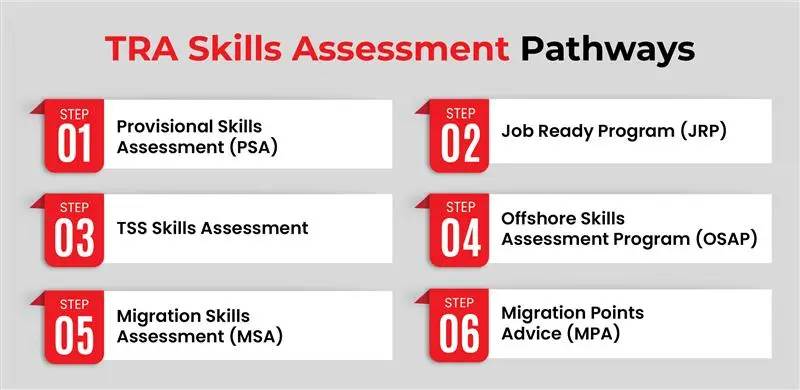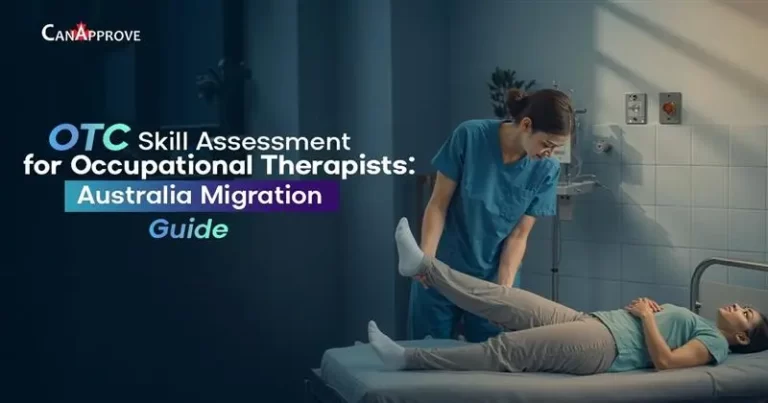Are you a skilled trade worker looking to migrate to Australia? Well, hold your kangaroos mate!! Before you pack your bags and book that one-way ticket to Australia, there’s a little something called the TRA Skills Assessment you need to know about.
Confused already? Don’t worry! You’re not alone.
“What is it? Do I need it? How do I get it? Will it take forever?!”
We’ve heard all the questions and we’re here to answer them all (minus the kangaroo part, sadly).
Whether you’re a talented tradesperson with years of hands-on experience or someone just stepping into the skilled work scene, this guide will help you understand everything about the TRA Skills Assessment.
Let’s break it down, step by step. Ready?
Table Of Content
1What is TRA Skills Assessment?2Who needs a TRA Skills Assessment?3Types of TRA Skills Assessment Programs (TRA Pathways)4TRA Occupation List5TRA Assessment Checklist6TRA Skill Assessment Processing Time7TRA Skills Assessment Fee8The Bottom Line9Frequently Asked Questions
What is TRA Skills Assessment?
The TRA Skills Assessment is your skills passport to Australia. It’s run by Trades Recognition Australia (TRA), the official authority that checks if your trade skills and qualifications match Oz standards.
Whether you’re a mechanic, electrician, chef, or any other skilled tradesperson dreaming of an Aussie life, this Australian Skill Assessment is your first big step.
Now, depending on your situation, TRA offers a few different pathways like:
- Job Ready Program (JRP)
- Offshore Skills Assessment (OSAP)
- Migration Skills Assessment (MSA)
Which one applies to you? Well, that depends on things like where you’re currently living, how much experience you have, and what qualifications you hold.
And yep, if you’re aiming for skilled migration under visa subclasses like 189, 190, or 491, a positive TRA assessment isn’t just helpful, it’s mandatory.
Still scratching your head? Don’t stress, we’ll walk you through it!
Who needs a TRA Skills Assessment?
If you’re a skilled worker aiming to migrate to Australia and your job is in the trades, the TRA Skills Assessment is for you. Here’s a quick look at who needs to complete a TRA Skills Assessment:
Skilled tradespeople like:
- Electricians
- Plumbers
- Chefs
- Mechanics
- Carpenters
- and other hands-on professionals in trade occupations
International students in Australia who’ve completed a trade qualification from a local training provider (RTO).
Overseas-qualified professionals who want to get their trade skills officially recognised for migration.
Visa applicants applying for:
- Temporary Skill Shortage (TSS) visa
- Skilled Independent Visa (Subclass 189)
- Employer-Sponsored Visas (like Subclass 186/48
It is important to ensure that your work experience is closely aligned with the nominated trade occupation to avoid rejections or delays.
Types of TRA Skills Assessment Programs (TRA Pathways)
Trades Recognition Australia (TRA) offers multiple skills assessment programs tailored to different visa types, applicant backgrounds, and qualifications. Whether you’re an international student, a skilled worker offshore, or applying for temporary or permanent migration to Australia, there’s a specific TRA pathway designed to assess your trade skills against Australian standards.

Explore the table below to find the right assessment program for your situation:
| Program Name | Best For | Purpose | Key Components / Notes |
|---|---|---|---|
| Provisional Skills Assessment (PSA) | International graduates in Australia | Confirms Australian qualification + identity for 485 visa | First step before entering the Job Ready Program |
| Job Ready Program (JRP) | International students with Australian trade qualifications | Demonstrates job-readiness for permanent residency | 4 Stages: PSA → JRE → JRWA → JRFA |
| Temporary Skills Shortage (TSS) Skills Assessment | Skilled workers applying for subclass 482 visa | Confirms skills for Australian temporary work visa | Pathway depends on whether you hold an Australian qualification/licence |
| Offshore Skills Assessment Program (OSAP) | Offshore applicants (for PR visas) | Assesses skills and issues AQF qualification or OTSR | Two Pathways: • Pathway 1: No Australian qualification • Pathway 2: With Australian qualification/licence |
| Migration Skills Assessment (MSA) | Skilled migration applicants (subclass 189, 190, 491) with overseas experience | Validates overseas qualifications/experience for migration | Documentary assessment only; doesn’t lead to employment, licence, or further training |
| Migration Points Advice (MPA) | Applicants unsure of claimable skilled points | Estimates potential skilled migration points | Optional service used before lodging a visa application |
TRA Occupation List
The TRA Occupation List is an Australian Skilled Occupation List refers to the list of trade and technical occupations eligible for skills assessment by Trades Recognition Australia (TRA) — one of the Australian government’s authorized assessing authorities for skilled migration.
TRA Occupation List (as of 2024–2025)
Here are some of the most commonly assessed occupations by TRA (aligned with ANZSCO codes):
Construction & Building Trades
- Carpenter (331212)
- Joiner (331213)
- Bricklayer (331111)
- Plumber (334111)
- Wall and Floor Tiler (333411)
- Painter and Decorator (332211)
- Roof Plumber (334115)
Automotive Trades
- Motor Mechanic (General) (321211)
- Diesel Motor Mechanic (321212)
- Automotive Electrician (321111)
- Panel Beater (324111)
- Vehicle Painter (324311)
Electrical & Electronics
- Electrician (General) (341111)
- Airconditioning and Refrigeration Mechanic (342111)
- Electronics Trades Worker (342313)
Metal & Engineering Trades
- Metal Fabricator (322311)
- Welder (First Class) (322313)
- Fitter (General) (323211)
- Toolmaker (323412)
Hair & Beauty
- Hairdresser (391111)
- Barber (391111)
Hospitality Trades
- Chef (351311)
- Cook (351411)
- Baker (351111)
- Pastrycook (351112)
The full list is available on Australian Government TRA Website.
TRA Assessment Checklist
Before applying for a TRA (Trades Recognition Australia) skills assessment, it’s important to prepare and organise all required documents. This checklist will help you understand what you need to submit and ensure your application is complete, accurate, and ready for processing. Whether you’re applying through MSA, OSAP, or another pathway, use this step-by-step guide to stay on track.
1. Choose the Correct TRA Pathway
Identify which assessment pathway applies to you –
- MSA (Migration Skills Assessment)
- OSAP (Offshore Skills Assessment Program)
- JRP/TRS (for students in Australia)
- MPA (for points advice)
2. Confirm your Occupation and ANZSCO Code
Check if your trade is listed on the TRA Occupation List and note your ANZSCO code (e.g., 334111 for Plumber).
3. Passport Copy (certified)
Submit a certified copy of your passport bio page to prove your identity.
4. Educational Certificates and Transcripts
Provide copies of your trade qualifications and academic records.
5. Course Syllabus or Content (if required):
Include details of your course subjects/modules to help verify your training.
6. Work Experience Documents
Submit proof of work, including:
- CV or Resume
- Employer reference letters describing duties and work period
- Payslips, tax records, or bank statements to support your work claims.
7. English Language Test Results (if required)
If your visa or pathway requires, include results from IELTS, PTE, or TOEFL.
8. Application Form Filled Online
Complete and submit the official TRA application on their portal.
9. Payment Receipt
Pay the applicable assessment fee and include a receipt for confirmation.
TRA Skill Assessment Processing Time
Before applying for migration to Australia as a skilled tradesperson, it’s important to understand the expected processing times for your TRA skills assessment. The timeframes vary based on the pathway you choose and how complete your application is. Here’s a quick breakdown of the TRA Skills Assessment processing time:
1. Migration Skills Assessment (MSA)
The official processing time for MSA is up to 120 days (around 4 months). However, due to a high number of applications, it can often take 6 to 9 months in real cases. Submitting a complete and well-documented application can help avoid further delays.
2. Offshore Skills Assessment Program (OSAP)
For OSAP, the processing time is typically around 15 weeks after all required documents are submitted to the RTO (Registered Training Organisation). Timelines may vary slightly depending on the trade and the efficiency of the RTO chosen.
3. Job Ready Program (JRP)
TRA takes up to 45 days to register your JRP application. The overall process, including workplace assessments, may take 6 months or more. After the final assessment, it usually takes 11 weeks to receive the outcome.
4. Priority Processing
Priority or fast-track processing is not available for trade occupations under TRA pathways like MSA or OSAP. It is usually limited to general or professional skilled occupations only.
Important Tip
Always submit a complete, decision-ready application with all required documents to avoid back-and-forth communication. Allow extra time in your migration plan—3 to 9 months, depending on the pathway.
TRA Skills Assessment Fee
When applying for a TRA skills assessment, you’ll need to pay a processing fee, which varies based on the type of assessment pathway you choose. Below is a breakdown of the key TRA Skills Assessment fee as of the most recent update:
1. Migration Skills Assessment (MSA)
- Fee: AUD $1,000
- This pathway is for qualified tradespeople who have Australian qualifications or offshore qualifications and relevant work experience.
- It’s one of the most common routes for people applying for skilled migration to Australia.
2. Offshore Skills Assessment Program (OSAP)
- Fee: AUD $2,800
- This applies to candidates from specific countries and for nominated occupations identified by the Australian Government.
- Includes both a document review and a practical assessment.
3. Temporary Skills Shortage (TSS) Skills Assessment
- Fee: AUD $1,280 – $2,800
- For applicants applying for a subclass 482 visa (TSS visa).
- The cost depends on the occupation and country of origin; includes document checks and practical testing.
4. Migration Points Advice (MPA)
- Fee: AUD $275
- This is an optional service that provides advice on the number of points a trade qualification is worth under the skilled migration program.
5. Reassessment / Appeal / Review Fees
- Reassessment of documents only: AUD $600
- Full reassessment including practical: Same as original fee (e.g., AUD $2,800 for OSAP)
- Appeals / Reviews: Fees vary depending on complexity and stage.
The Bottom Line
Phew! That was a lot, wasn’t it?
But hey! If you’ve made it this far, you’re already ahead of the game.
The TRA Skills Assessment might sound like a big deal (and okay, it kinda is), but now you know what it’s all about. Whether you’re flipping burgers, fixing engines, wiring homes, or laying bricks like a pro, this assessment is your golden ticket to Aussie shores. So take a deep breath, gather your docs, double-check your pathway, and get cracking! Because that dream of working in Australia ? It’s not just possible — it’s doable.
For official information, visit the TRA Skills Assessment Website
Catch you on the other side, mate!





